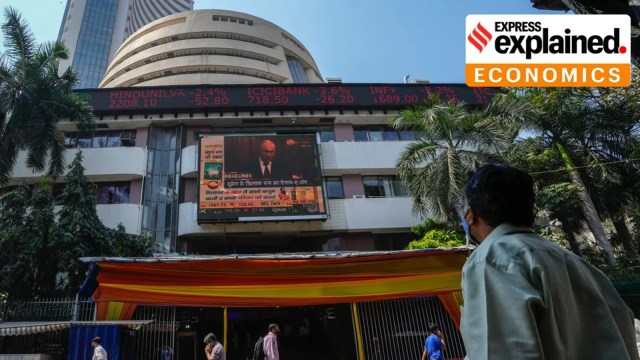After Union Budget, what factors will influence Sensex and Nifty today?
The market volatility on Monday is expected to continue the trend seen on Saturday after the budget prioritised consumption to boost slowing consumption over capital expenditure.
 The recent announcement by US President Donald Trump to impose tariffs on goods imported from China, Mexico and Canada will also weigh on investor sentiments. (File photo)
The recent announcement by US President Donald Trump to impose tariffs on goods imported from China, Mexico and Canada will also weigh on investor sentiments. (File photo)Domestic stock markets may witness volatility on Monday (February 3) amid positive sentiments driven by the Union Budget’s shift towards consumption-led growth and the likely sell-offs following the proposal to increase the long-term capital gains tax on all income of foreign institutional investors (FIIs). The market volatility on Monday is expected to continue the trend seen on Saturday after the budget prioritised consumption to boost slowing consumption over capital expenditure.
How will markets open on Monday?
Analysts said that markets are likely to remain choppy on Monday.
“Markets may remain weak in short-term as the rupee remains weak and also on account of the fear that certain FIIs would start selling their long-term holdings which will be taxed higher on par with domestic investors from FY2026,” said G Chokkalingam, Founder & Head of Research, Equinomics.
The recent announcement by US President Donald Trump to impose tariffs on goods imported from China, Mexico and Canada will weigh on investor sentiments.
“If this (tariff hikes) escalates into a fresh trade war, it could hurt global risk appetite, leading to FII outflows from emerging markets, including India. If the tariffs are sector-specific, their impact might be contained,” said Narinder Wadhwa, Managing Director & CEO of SKI Capital.
Indian exporters may also see some negative impact, he said. The positive for the market on Monday will be the consumption stimulus, that is, reduction in personal income tax rates, announced in the Union Budget 2025-26.
On the personal income tax front, Finance Minister Nirmala Sitharaman, in the Union Budget 2025-26, rationalised tax slabs by increasing the tax exemption limit up to Rs 12 lakh. To reduce the multiplicity of rates and compliance burden, the Budget also proposed to bring down certain tax deduction at source (TDS).
“Domestic sentiment may improve as the budget supports demand-driven growth,” said Wadhwa.
What was the trend in markets on Saturday?
Domestic benchmark indices Sensex and Nifty ended flat on Saturday in a highly volatile special trading session for the Union Budget amid a lower-than-expected increase in capital expenditure and reduction in personal income tax rates announced to give a fillip to the slowing consumption in the country.
The 30-share BSE Sensex marginally gained 0.01 per cent, or 5.39 points, to settle at 77,505.96 and the broader Nifty 50 lost 0.11 per cent, or 26.25 points to finish at 23,482.15 on Saturday.
In the Budget 2025-26 announced on February 1, Finance Minister Nirmala Sitharaman announced a capital expenditure of about Rs 11.21 lakh crore for FY 2025-26, a modest 10 per cent increase compared to a revised estimate of Rs 10.18 lakh crore in FY 2024-25.
“Instead of relying primarily on expanding industrial capacity and accelerating infrastructure projects, policymakers are now channelling resources toward stimulating consumer spending and domestic demand,” HDFC Securities said in a report.
This transformation reflects a growing recognition that sustainable economic growth requires a robust consumer base along with infrastructure improvements, it said.
While the benchmark indices witnessed volatility, shares of fast-moving consumer goods (FMCG), consumer durables and auto companies rose on Saturday.
Companies that surged included Radico Khaitan (8.97 per cent), Godrej Consumer Products (5.69 per cent), ITC Hotels (5 per cent), HUL (1.47 per cent), Blue Star (11.83 per cent) and Crompton (6.95 per cent).
How are foreign investors going to react on Monday?
The Finance Bill 2025 has proposed to hike the long-term capital gains (LTCG) tax on income of foreign institutional investors (FIIs) from 10 per cent to 12.5 per cent, effective April 1, 2026. Foreign investors, who were largely absent on Saturday, are likely to intensify selling on Monday, analysts believe.
“Around Rs 2,000 crore worth of Indian equities were sold by FIIs on Saturday. Perhaps more selling may happen on Monday due to the hike in long term capital gain tax for FIIs,” said Chokkalingam of Equinomics.
Geojit Financial Services’s Chief Investment Strategist V K Vijayakumar, however, feels that the marginal increase in LTCG tax on FIIs is insignificant.
In January 2025, foreign investors were sustained sellers in India. They sold on all trading days except one. Total FII selling was Rs 78,027 crore in January as per the National Securities Depository Ltd (NSDL) data.
- 01
- 02
- 03
- 04
- 05






































